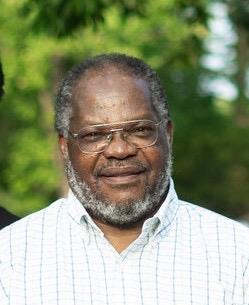Ezekiel Kalipeni
1954 - 2020

The AAG community is mourning the loss of Dr. Ezekiel Kalipeni, a longtime geography professor who died in the early hours of April 11, 2020 from heart-related complications while he was in his native country, Malawi at age 66. Dr. Kalipeni globally renowned for his work around medical geography, population and environment, and international development focusing on Africa retired from an illustrious academic career in the Department of Geography & Geographic Information Science at the University of Illinois (Urbana-Champaign) in June 2019. Dr. Kalipeni was a prolific scholar of human geographer, a great teacher and mentor, a philanthropist, a world traveler, a devoted husband, and loving father.
Dr. Kalipeni earned his Bachelor of Social Science degree (with distinction) at the University of Malawi (1979), and masters (1982) and Ph.D. (1986) degrees in geography at the University of North Carolina at Chapel Hill. Although he admitted that his original career plans lay elsewhere, and that he came to geography “by chance,” he was an outstanding scholar and gifted teacher, highly respected by his colleagues and committed to his students. His distinguished academic and public intellectual career spanned nearly four decades having worked at the University of Malawi (1986-88), the University of North Carolina at Chapel Hill (1988-91), Colgate University (New York, 1991-94), and the University of Illinois at Urbana-Champaign (1994-2019). During his career, he published 16 books and over 170 peer reviewed articles, book and encyclopedia chapters. Dr. Kalipeni’s work is widely acknowledged in citations from these and other published works, at many conferences, symposia and workshops, as well as in policy circles in Africa and other developing countries.
He earned international reputation for his seminal work on spatial analysis and mapping of the HIV/AIDs epidemic in Africa and in advancing understanding of the complex underlying drivers. Dr. Kalipeni devoted many years to field research in southern Africa to examine the demographic, economic, cultural, political, economic, socio-institutional and geographic factors that shape the spatial and temporal spread of HIV and other health challenges. His work on issues of health disparities, population and natural resources management, and development in Sub-Saharan Africa with a focus on southern Africa is also widely recognized. In 2014, the American Association of Geographers (AAG) Africa Specialty Group honored Dr. Kalipeni with the Kwado-Konadu-Agyemang Distinguished Scholar in African Geography Award.
During his career, Dr. Kalipeni provided significant leadership and service to the scholarly and scientific community. He served as interim Director of the Center of African Studies 2001-2002 at the University of Illinois. and as Program Director of the National Science Foundation’s Spatial Sciences Program (2009-2011). Some scholars have remarked how helpful he was as a Program Director at NSF, going well beyond the call of duty. He is also credited as the sole editor of the African Geographical Review for several years at a critical transitional time in the journal’s development. It is now a thriving journal published by Taylor & Francis in association with the Africa Specialty Group of the AAG (one of three journals published by the AAG). This journal has become a critical outlet for geographic scholarship on Africa for geographers and scholars from related disciplines in the USA, Africa and other parts of the world. Within the AAG he chaired the West Lakes Division and the Africa Specialty Group, was on the Board for the Medical Geography Group and was an active member in the Population Specialty Group. He was also the consummate collaborator, team player and leader, and collaborated with so many colleagues with geography and related fields within and outside the USA.
Fondly known as “Dr. Zeke” among his students and close colleagues, he stood out for his selfless and untiring support and mentoring for students and upcoming scholars, particularly those of African extraction. Many of the students he has trained over the past four decades have built successful careers in academia, the public and private sector in the US, Malawi and other parts of Africa. Former students and junior scholars within the AAG Africa Specialty Group—including ones from other disciplines—attest not only to his mentorship but also active support through research collaborations and co-publishing with many. Many upcoming scholars have credited him for some of their career success. Dr Zeke never forgot his first alma mater, where he also launched his academic career. Dr. Kalipeni cultivated and sustained strong research and mentoring relationships with the university, and after retiring, he donated and shipped his 1,700-volume personal library to the Department of Geography and Earth Sciences, University of Malawi.
As a teacher, Dr. Kalipeni took joy in teaching large classes of undergraduate students, including Global Development & Environment, and Cities of the World, and others including population geography and Geography of Sub-Saharan Africa. He made his courses exciting and students liked his sense of humor, preparedness, and for inculcating critical thinking among students. He inspired graduate students and published with most of them, building a bridge for their future careers. He was particularly helpful to international students, helping them to navigate the US education system, and going beyond to providing temporary housing at his house if they were stranded.
Despite his prolific academic career, Dr. Kalipeni maintained some balance with family life. His wife, Fatima, and grown children Josephine, Jackie, Juliana, Jacob, Joshua, Natalia and Melissa, remember him as a loving and proud husband and father, a jovial storyteller with a ‘wicked’ sense of humor, a generous giver, and a motivator who taught them the value of hard work. Together with his family, he established the Kalipeni Foundation to support local development projects in Malawi’s southern district of Mulanje, including on education, safe water supply, environmental management and livelihood support. His family will carry on his legacy through this foundation and in living the many lessons he taught them.
He will be missed dearly by colleagues, family, and friends but his legacy and works will live on.
Fare you well, Dr. Zeke
May his soul rest in eternal peace.